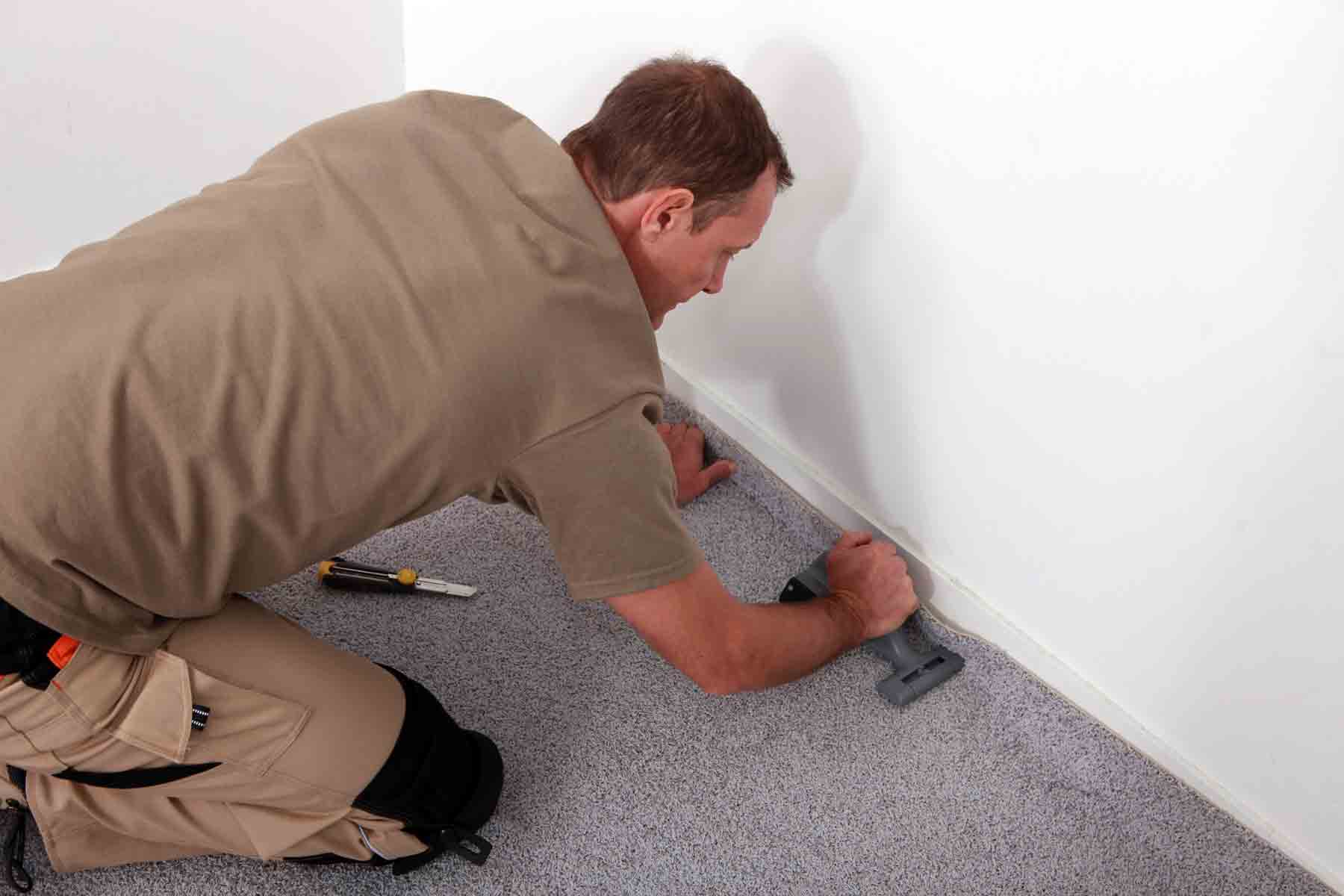
Top Factors to Consider Before Choosing Kitchen Flooring
Water Resistance and Spills
Kitchens get a lot of water from splashes and spills. Pick a floor that handles water well without getting damaged or slippery. Good choices are luxury vinyl, tile, and some engineered hardwood.
Durability for Heavy Foot Traffic
Kitchens have lots of foot traffic. Floors need to be strong to handle movement and dropped items. Choose materials that resist dents and scratches.
Comfort Underfoot
Standing comfort is important if you cook a lot. Some floors, like cork or vinyl, are softer. You can also use mats for extra comfort.
Ease of Cleaning and Maintenance
Spills are common in the kitchen. Choose floors that are easy to clean, like tile, sealed hardwood, or vinyl. These make cleaning quick and easy.
Visual Style and Design Cohesion
The kitchen floor affects the room’s look. Think about how the floor matches your cabinets and countertops. Whether you like wood, stone, or tiles, make sure the floor fits your style.
Kitchen Flooring Factors Comparison Chart
| Material | Water Resistance | Durability | Comfort | Maintenance | Style Compatibility |
|---|---|---|---|---|---|
| Luxury Vinyl Plank (LVP) | ✅ Waterproof | ✅ High | ✅ Soft | ✅ Easy | ✅ Versatile |
| Porcelain Tile | ✅ Waterproof | ✅ High | ❌ Hard | ✅ Easy | ✅ Modern/Classic |
| Ceramic Tile | ✅ Water-Resistant | ✅ High | ❌ Hard | ✅ Easy | ✅ Traditional |
| Hardwood | ❌ Not Ideal | ✅ High | ✅ Warm | ❌ Moderate | ✅ Timeless |
| Engineered Wood | ⚠️ Water-Resistant | ✅ Moderate | ✅ Warm | ⚠️ Moderate | ✅ Contemporary |
| Laminate | ⚠️ Water-Resistant | ✅ Moderate | ⚠️ Moderate | ✅ Easy | ✅ Modern |
| Sheet Vinyl | ✅ Waterproof | ✅ Moderate | ✅ Soft | ✅ Easy | ✅ Varied |
| Cork | ⚠️ Water-Resistant | ⚠️ Moderate | ✅ Cushioned | ⚠️ Moderate | ✅ Eco-Friendly |
| Concrete | ✅ Waterproof | ✅ High | ❌ Hard | ✅ Easy | ✅ Industrial |
| Natural Stone | ⚠️ Water-Resistant | ✅ High | ❌ Hard | ❌ High | ✅ Luxurious |
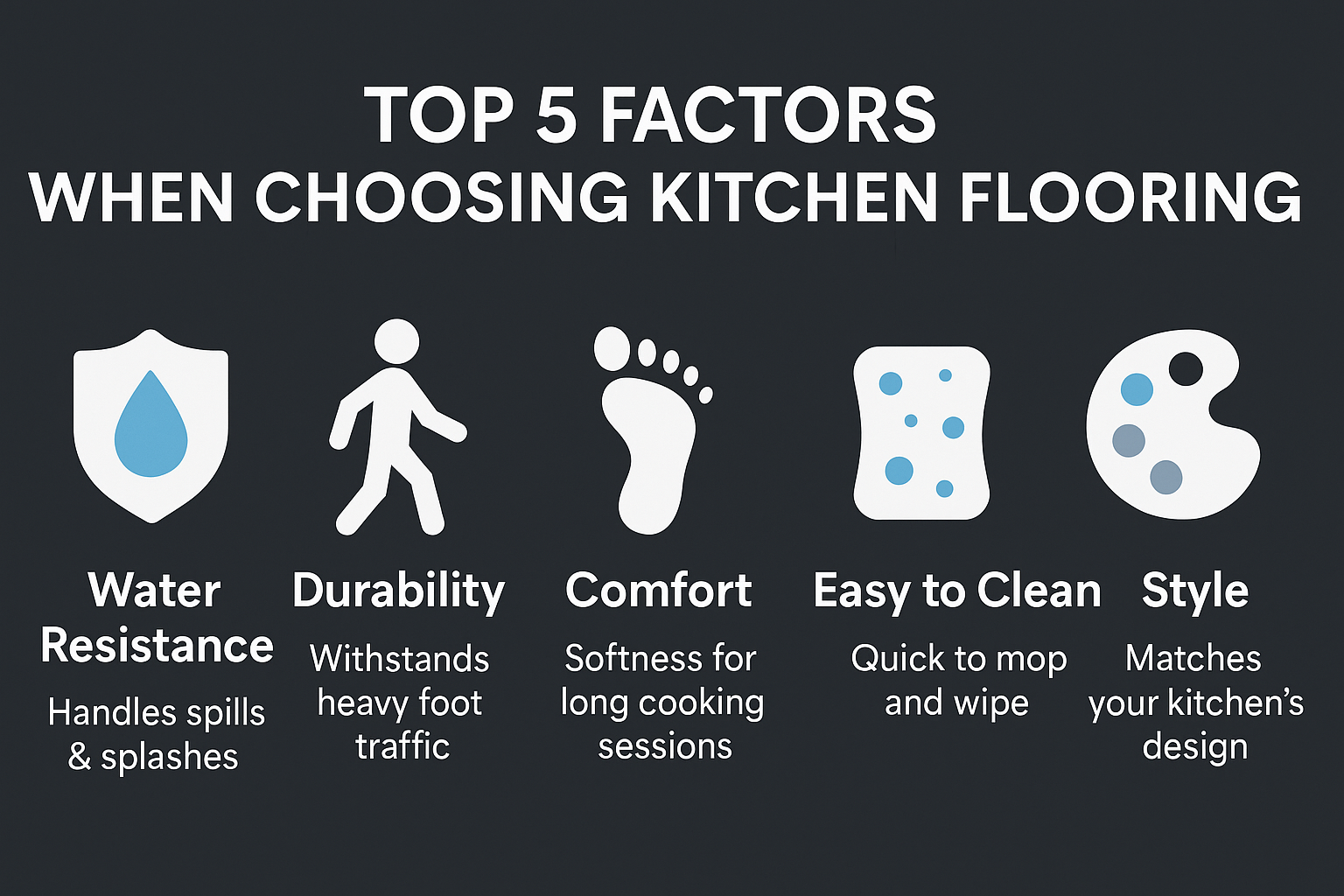
Best Kitchen Flooring Materials (Pros & Cons)
Picking the best kitchen flooring involves style, performance, and practicality. Here’s a look at popular kitchen flooring choices in 2025 and their benefits and downsides:
Hardwood Flooring in the Kitchen
Pros: Gives warmth and character, boosting home value.
Cons: Can get damaged by moisture and may warp if not sealed well.
Luxury Vinyl Plank (LVP) in the Kitchen
Pros: Waterproof, affordable, looks like wood or stone, and comfy.
Cons: Cheaper versions might dent or fade with heavy use or sunlight.
Tile Flooring in the Kitchen (Ceramic & Porcelain)
Pros: Durable, water-resistant, with many finishes and colors.
Cons: Can feel cold and hard, often needs rugs or heating.
Laminate Flooring in the Kitchen
Pros: Cost-effective with modern styles, easy to clean.
Cons: Can be affected by water and may not last as long as vinyl or tile.
Natural Stone Flooring in the Kitchen
Pros: Adds elegance and durability.
Cons: Needs sealing, is pricey, and can be slippery or cold.
Sheet Vinyl Flooring in the Kitchen
Pros: Seamless, waterproof, and soft.
Cons: Might not look as real as LVP and can wear down in busy areas.
Engineered Wood in the Kitchen
Pros: Stylish, resists moisture, and warm.
Cons: Can still be damaged by water and costs more than vinyl or laminate.
Cork Flooring in the Kitchen
Pros: Soft, eco-friendly, and reduces noise.
Cons: Needs regular sealing and can fade in sunlight.
Concrete Flooring in the Kitchen
Pros: Durable and waterproof with a modern look.
Cons: Can feel hard and cold without heating or rugs.
| # | Material | Pros (Kitchen Use) | Cons (Kitchen Use) |
|---|---|---|---|
| 1 | Luxury Vinyl Plank (LVP) | Waterproof, realistic look, affordable, soft | May dent or fade in busy kitchens |
| 2 | Porcelain/Ceramic Tile | Water-resistant, very durable | Cold and hard, may need rugs or heating |
| 3 | Sheet Vinyl | Seamless, soft, quiet, budget-friendly | Less realistic, not as durable over time |
| 4 | Engineered Wood | Moisture-tolerant, warm look | Can be damaged by water |
| 5 | Laminate Flooring | Affordable with water-resistant options | May swell if water gets in |
| 6 | Concrete | Durable, waterproof, modern style | Cold and hard, may need sealing and heating |
| 7 | Cork | Soft, quiet, eco-friendly | Needs sealing, may fade |
| 8 | Natural Stone | Elegant, durable | Pricey, needs sealing, can be slippery |
| 9 | Hardwood Flooring | Timeless, warm look | Not good with moisture without maintenance |

Waterproof vs. Water-Resistant: What You Really Need For Your Kitchen Floors
When picking kitchen flooring, it’s important to know how the material handles water. Not all floors that resist water are the same — people often mix up “waterproof” and “water-resistant”.
🔍 Key Differences Explained
- Waterproof kitchen flooring is fully protected from water — it can be soaked or cleaned without getting damaged.
- Water-resistant kitchen flooring can handle small spills but might soak up water if it sits too long or gets into cracks.
Think of waterproof as a raincoat, and water-resistant as a hoodie — both protect, but one is better in heavy rain.
💧 Which Flooring Materials Are Truly Waterproof?
If spills or leaks happen in your kitchen, these waterproof kitchen flooring materials are best:
- Luxury Vinyl Plank (LVP) and Sheet Vinyl – Completely waterproof, perfect for busy kitchens.
- Porcelain and Ceramic Tile – Waterproof when installed with the right grout and sealant.
- Concrete Flooring – Fully waterproof when sealed; ideal for modern kitchens.
🏡 Best Flooring for High-Moisture Kitchens
For homes with kids, pets, or lots of cooking, these kitchen flooring options offer great waterproofing, comfort, and durability:
- Luxury Vinyl Plank (LVP) – Best for waterproofing and style.
- Sheet Vinyl – Offers seamless protection for less money.
- Tile (Porcelain or Ceramic) – Very durable and waterproof if installed right.
- Engineered Wood with Water-Resistant Core – Gives a wood look with some water protection.
Don’t use solid hardwood or unsealed cork in wet kitchens unless you keep up with maintenance and sealing.
Easy-to-Clean Kitchen Flooring Options
A clean kitchen isn’t just about being tidy — it’s about picking kitchen flooring that hides dirt and makes life easier. Whether it’s crumbs, spills, or daily foot traffic, some floors need less work to keep clean.
🧼 Best Kitchen Floors for Stain Resistance
- Porcelain and Ceramic Tile – Naturally resist stains and easy to clean, even after cooking messes.
- Luxury Vinyl Plank (LVP) – The protective layer keeps stains, scuffs, and dirt away — great for busy kitchens.
- Sheet Vinyl – Seamless and stops spills from sinking in, making cleaning fast.
- Sealed Concrete – Stain-resistant when sealed; ideal for modern kitchens with bold looks.
👀 Finishes That Hide Dirt and Crumbs
Some kitchen floors show less mess. These finishes help cover up daily dirt:
- Matte Finishes – Less shiny, hiding smudges and dust better than glossy ones.
- Textured Surfaces – Wood grains or stone looks can hide crumbs and footprints.
- Mid-Tone Neutrals – Colors like beige or taupe hide dirt and pet hair well.
✨ Keeping Shine and Durability
To keep your kitchen floor looking good:
- Sweep or vacuum often to clear grit that might scratch.
- Use a damp mop with approved cleaners — avoid strong chemicals on vinyl, laminate, or sealed wood.
- Reapply sealant on concrete, cork, or stone every few years for protection.
- Add felt pads to chair and stool bottoms to lessen wear over time.

Cost Breakdown Of Kitchen Flooring By Material & Labor
Choosing kitchen flooring can affect your renovation budget. Knowing the right info helps balance cost, performance, and durability. Learn about pricing, installation options, and long-term value.
💰 Material Cost Per Square Foot (2025 Averages)
| Material | Price (Per Sq Ft) |
|---|---|
| Sheet Vinyl | $1 – $3 |
| Laminate Flooring | $1.50 – $4 |
| Luxury Vinyl Plank | $2 – $5 |
| Ceramic Tile | $2 – $6 |
| Engineered Wood | $4 – $8 |
| Porcelain Tile | $3 – $10 |
| Concrete (Polished) | $3 – $12 |
| Cork Flooring | $4 – $7 |
| Hardwood Flooring | $6 – $12 |
| Natural Stone | $7 – $20+ |
Prices show mid-range quality. Premium designs or special finishes can increase costs. Want detailed cost info for each material?
- Laminate Flooring Cost Guide
- Vinyl Flooring Cost Guide
- Hardwood Flooring Cost Guide
- Tile Flooring Cost Guide
- Carpet Flooring Cost Guide
🛠️ Installation Cost: DIY vs. Professional
| Material | DIY-Friendly? | Professional Install Cost (Per Sq Ft) |
|---|---|---|
| Sheet Vinyl | ✅ Very Easy | $1 – $3 |
| Laminate | ✅ Easy | $2 – $5 |
| Luxury Vinyl Plank | ✅ Easy | $2 – $6 |
| Ceramic/Porcelain Tile | ❌ Moderate-Hard | $5 – $15 |
| Engineered Wood | ⚠️ Moderate | $4 – $10 |
| Hardwood | ❌ Difficult | $6 – $15 |
| Concrete | ❌ Specialized | $5 – $12 |
| Cork | ⚠️ Moderate | $4 – $8 |
| Natural Stone | ❌ Complex | $8 – $20+ |
DIY can save on labor, but complex materials like tile, stone, and hardwood are better for flooring installation professionals unless highly experienced. Thinking of installing it yourself? We have full DIY flooring guides for each major type:
- How To Install Laminate Flooring (DIY Guide)
- How To Install Vinyl Flooring (DIY Guide)
- How To Install Tile Flooring (DIY Guide)
- How To Install Hardwood Flooring (DIY Guide)
- How To Install Carpet Flooring (DIY Guide)
📈 Longevity & Value Over Time
- Best Value Long-Term: Porcelain Tile, Luxury Vinyl Plank, and Engineered Wood — great for durability and style.
- Budget-Friendly with Good Lifespan: Laminate and Sheet Vinyl — easy to install, less lifespan (~10–15 years).
- Premium Investment: Natural Stone and Hardwood Flooring — high cost, but excellent durability and boosts home value if cared for.
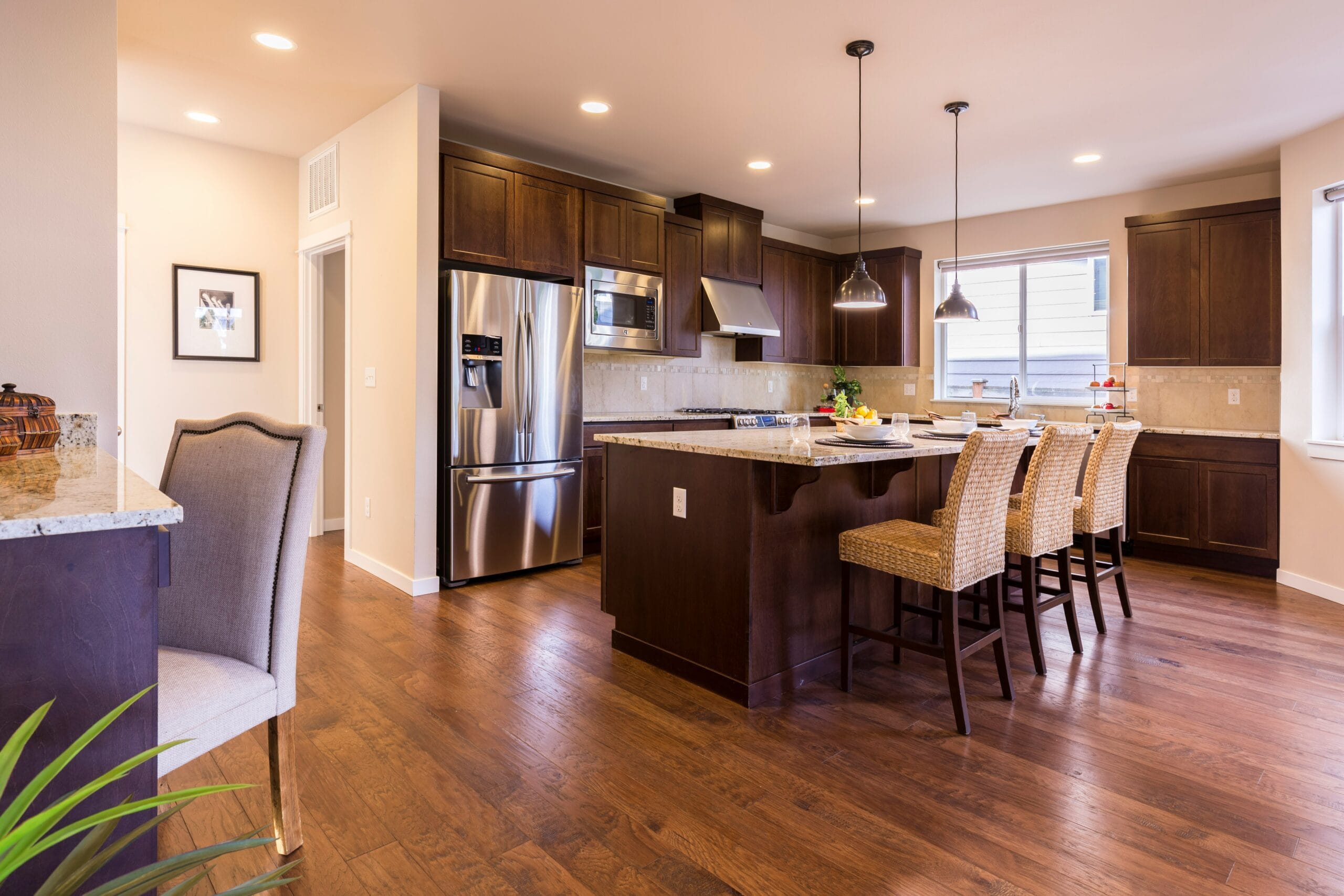
Eco-Friendly Kitchen Flooring Options
If you’re planning a healthier home or want to lower your environmental impact, picking the right eco-friendly kitchen flooring can make a big difference. The good news is, sustainable materials are now stylish, long-lasting, and better for your indoor air quality.
🌱 Best Eco-Friendly Kitchen Flooring Options
- Cork Flooring – Made from the bark of cork oak trees, cork is collected without hurting the tree. It’s naturally antimicrobial, soft underfoot, and great for energy-saving kitchens because of its insulating features.
- Bamboo Flooring – As a fast-growing grass, bamboo is very renewable and gives a sleek, modern look to kitchen floors. Strand-woven bamboo is the toughest choice for busy homes.
- Reclaimed Hardwood – Reuses existing materials, cutting the need for new trees. Each piece has a story, giving rustic character and unique charm — perfect for farmhouse or vintage-style kitchens.
🏡 VOC Ratings and Healthy Home Tips
Not all “natural” floors are safe for indoor air. Look for low-VOC or zero-VOC certified flooring to avoid harmful chemical emissions:
- Check for certifications like FloorScore, Greenguard GOLD, or CARB Phase 2 compliance.
- Pick water-based finishes and glues.
- Avoid vinyl or laminate products with high formaldehyde or phthalates — unless labeled as low-emission.
Eco-friendly kitchen flooring isn’t just about materials — it’s about keeping your family healthy and maintaining good indoor air quality.
15 Kitchen Flooring Ideas for 2025
- Wide Plank Hardwood Flooring
Wide plank hardwood floors, such as oak or maple, bring a sense of openness and continuity to kitchen spaces. Their expansive boards showcase natural wood grains, adding warmth and elegance. Explore our Hardwood Flooring options

- Herringbone Pattern in Luxury Vinyl Plank
Herringbone patterns in luxury vinyl planks offer a classic design with modern durability. This style adds visual interest and sophistication to kitchens while being resistant to moisture and wear. Discover our Luxury Vinyl Plank selections

- Matte Finish Porcelain Tiles
Matte finish porcelain tiles provide a sleek, contemporary look that minimizes glare and hides smudges, making them ideal for busy kitchens. Browse our Porcelain Tile collection
- Seamless Indoor-Outdoor Transitions
Using consistent flooring materials, like porcelain tiles, from the kitchen to adjacent outdoor areas creates a harmonious flow, perfect for entertaining and open-plan living. View our Laminate Flooring options

- Natural Stone-Look Porcelain Tiles
Porcelain tiles that mimic natural stone offer the luxurious appearance of materials like marble or slate with enhanced durability and lower maintenance. Explore our Porcelain Tile selections

- Large Format Tiles
Large format tiles reduce grout lines, resulting in a seamless and expansive look that enhances the kitchen’s spaciousness. Check out our Ceramic Tile collection

- Wood-Look Porcelain Tiles
Combining the warmth of wood aesthetics with the durability of porcelain, these tiles are resistant to moisture and wear, making them suitable for high-traffic kitchen areas. Discover our Porcelain Tile options
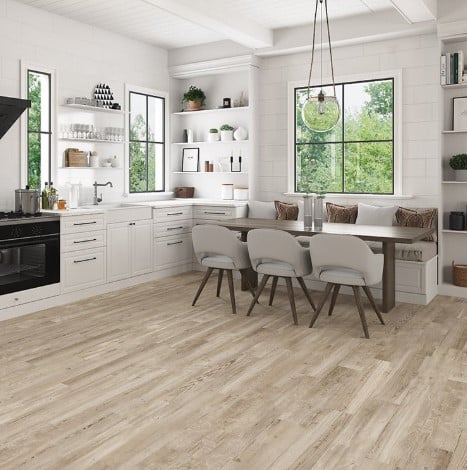
- Patterned & Decorative Tiles
Incorporating bold patterns, such as geometric or Moroccan designs, adds personality and a focal point to the kitchen floor. Browse our Porcelain Tile collection

- Sustainable Materials
Eco-friendly options like bamboo, cork, and reclaimed wood support sustainability while maintaining style. Explore our Hardwood Flooring selections

- Textured Finishes
Floors with tactile surfaces, such as hand-scraped wood or embossed tiles, add depth and character, enhancing the sensory experience of the kitchen environment. Discover our Hardwood Flooring options

- Neutral & Earthy Tones
Colors like beige, taupe, and soft greys are trending, providing a versatile backdrop that complements various kitchen styles and color schemes. View our Porcelain Tile collection
- Mixed Material Designs
Combining different flooring materials, such as wood and tile, allows for creative zoning within open-plan kitchens, delineating areas like cooking and dining spaces. Explore our Hardwood Flooring selections
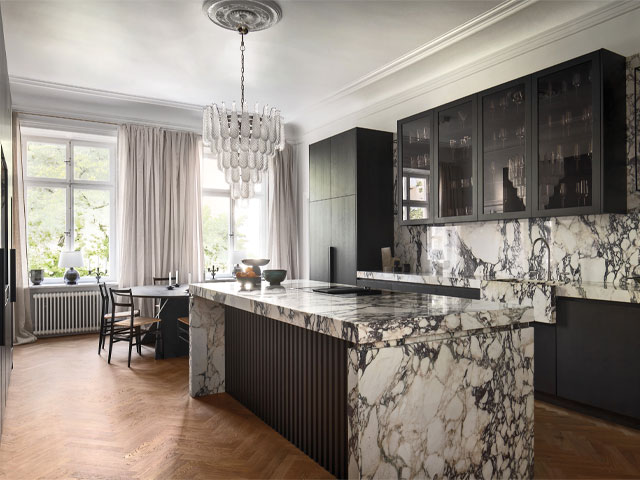
- Checkerboard Patterns
Classic black-and-white checkerboard floors make a comeback, providing a timeless and playful design element. Browse our Porcelain Tile collection
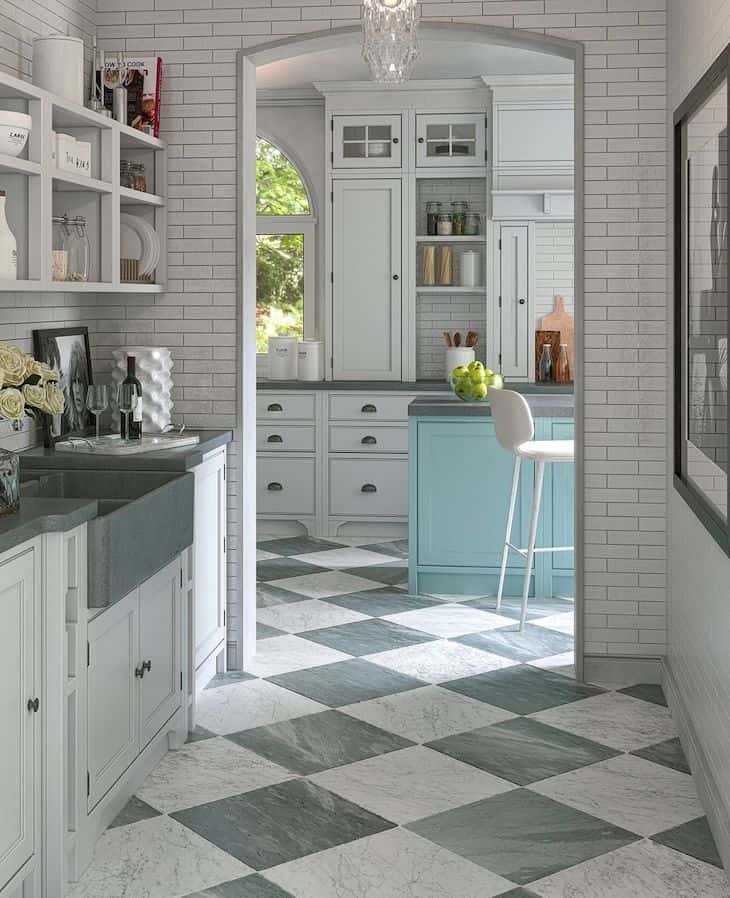
- Terra-Cotta Tiles
Embracing the warmth of terra-cotta tiles brings a rustic charm and earthy tone to the kitchen environment. Discover our Porcelain Tile options

- Engineered Hardwood Flooring
Engineered hardwood offers the beauty of natural wood with added stability and resistance to moisture, making it suitable for kitchen environments. Explore our Engineered Hardwood Flooring selection
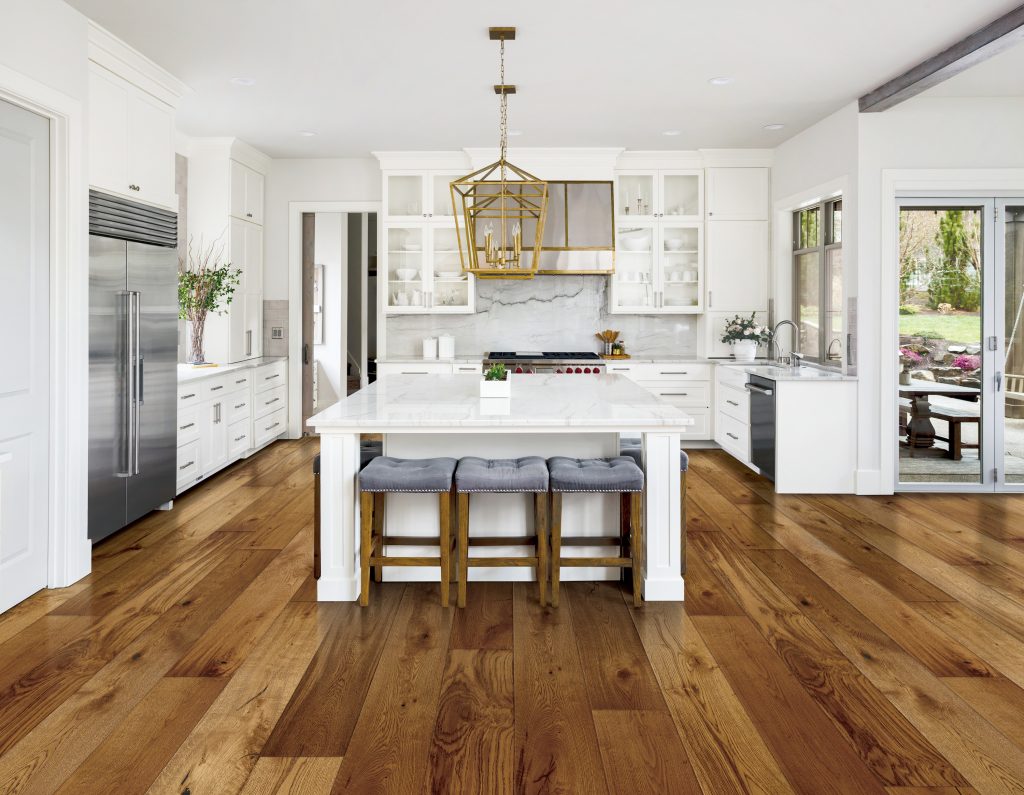
Final Tips Before You Buy Kitchen Flooring
Before making your final decision, it’s worth slowing down to double-check a few important steps. These small actions can save you time, money, and future headaches when choosing the perfect kitchen flooring.
📦 1. Order Extra Material for Cuts and Waste
Always purchase 10–15% more flooring than your kitchen’s actual square footage. This accounts for waste from cuts, mistakes, and future repairs. Running short mid-installation — especially with patterned tiles or discontinued stock — can delay your entire project.
💡 2. Test Flooring Samples in Your Kitchen Lighting
Flooring looks different in daylight, artificial light, and under-cabinet LEDs. What appears warm in the store might look too cool or dull in your space. Place samples on the floor and check them at different times of day to see how they interact with your kitchen’s colors and lighting.
🛡️ 3. Understand Manufacturer Warranties
Not all warranties are created equal. Read the fine print to understand:
- Whether it covers water damage, wear, fading, or installation issues.
- If professional installation is required to activate the warranty.
- What voids the warranty — like using unapproved cleaners or DIY installs on certain products.
🎯 Bonus Tip: Match Floor Choice to Lifestyle
- Busy family home? Go waterproof and low-maintenance (LVP, tile, or sheet vinyl).
- Design-focused kitchen? Explore trending styles like herringbone vinyl or natural stone-look tiles.
- Eco-conscious household? Prioritize cork, bamboo, or reclaimed wood with low-VOC certifications.
Do You Need Help Choosing or Installing Your Kitchen Flooring?
Now that you’ve explored the top kitchen flooring materials, costs, and design ideas, you’re one step closer to creating a beautiful and functional kitchen. But if you’d rather leave the measuring, prep, and installation to the pros, our expert team is ready to help.
We take care of everything — from subfloor inspection and moisture testing to precise installation of luxury vinyl plank, porcelain tile, engineered hardwood, laminate, and more.
We’ll also help you select the right kitchen flooring material based on your lifestyle, layout, and budget — whether you want waterproof durability, low-maintenance comfort, or on-trend design.
Click here to contact us today to schedule your free in-home consultation and find out if we serve your area!


